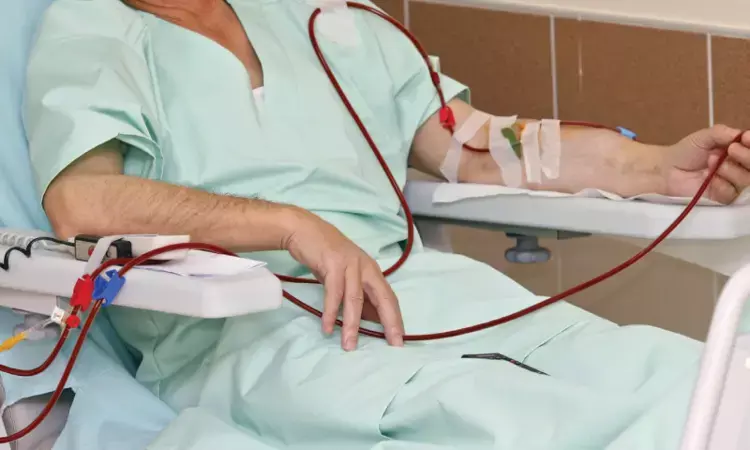- Home
- Medical news & Guidelines
- Anesthesiology
- Cardiology and CTVS
- Critical Care
- Dentistry
- Dermatology
- Diabetes and Endocrinology
- ENT
- Gastroenterology
- Medicine
- Nephrology
- Neurology
- Obstretics-Gynaecology
- Oncology
- Ophthalmology
- Orthopaedics
- Pediatrics-Neonatology
- Psychiatry
- Pulmonology
- Radiology
- Surgery
- Urology
- Laboratory Medicine
- Diet
- Nursing
- Paramedical
- Physiotherapy
- Health news
- Fact Check
- Bone Health Fact Check
- Brain Health Fact Check
- Cancer Related Fact Check
- Child Care Fact Check
- Dental and oral health fact check
- Diabetes and metabolic health fact check
- Diet and Nutrition Fact Check
- Eye and ENT Care Fact Check
- Fitness fact check
- Gut health fact check
- Heart health fact check
- Kidney health fact check
- Medical education fact check
- Men's health fact check
- Respiratory fact check
- Skin and hair care fact check
- Vaccine and Immunization fact check
- Women's health fact check
- AYUSH
- State News
- Andaman and Nicobar Islands
- Andhra Pradesh
- Arunachal Pradesh
- Assam
- Bihar
- Chandigarh
- Chattisgarh
- Dadra and Nagar Haveli
- Daman and Diu
- Delhi
- Goa
- Gujarat
- Haryana
- Himachal Pradesh
- Jammu & Kashmir
- Jharkhand
- Karnataka
- Kerala
- Ladakh
- Lakshadweep
- Madhya Pradesh
- Maharashtra
- Manipur
- Meghalaya
- Mizoram
- Nagaland
- Odisha
- Puducherry
- Punjab
- Rajasthan
- Sikkim
- Tamil Nadu
- Telangana
- Tripura
- Uttar Pradesh
- Uttrakhand
- West Bengal
- Medical Education
- Industry
Single dose SARSCoV-2 vaccine not adequate for dialysis patients:CMAJ

In a recent development, new research in Canadian Medical Association Journal has shown that most hemodialysis patients do not develop adequate antibodies after their first dose of SARSCoV-2 vaccine.
"We advise that the second dose of the BNT162b2 [Pfizer] vaccine be administered to patients receiving hemodialysis at the recommended 3-week time interval, and that rigorous SARS-CoV-2 infection prevention and control measures be continued in hemodialysis units until vaccine efficacy is known," elaborates Dr. Rita Suri, a nephrologist at the Research Institute of the McGill University Health Centre, Montreal, Quebec, with coauthors.
Patients receiving hemodialysis are especially vulnerable to COVID-19 as they must leave their homes three times a week for dialysis at a health care facility, and case fatality rates are 20%–30%, which is 10 times higher than in the general population.
The study included 154 patients receiving hemodialysis in Quebec (135 without and 19 with prior SARS-CoV-2 infection), 40 healthy volunteers (20 without and 20 with prior SARS-CoV2 infection) and convalescent plasma from 16 dialysis patients who survived COVID-19. Researchers measured antibody levels in the participants and found dialysis patients who were never previously exposed to COVID-19 had lower antibody levels than participants in the two control groups, even up to 8 weeks later.
Data analysis revealed that –
- Antibodies were undetectable in 57% of patients receiving hemodialysis. Of the 154 patients receiving dialysis, 4 developed COVID-19 after vaccination.
- "Patients receiving hemodialysis who did not respond at 4 weeks remained nonresponders at 8 weeks, which is an argument against the possibility of a delayed response in these individuals.
- Older patients and those on immunosuppression had even lower seroconversion rates, but even younger patients not on immunosuppression had a significantly lower seropositivity rate than controls," write the authors. How well dialysis patients respond to the second dose of vaccine is being studied.
"Our results suggest that 1 dose of the BNT162b2 vaccine is insuficient to elicit a robust humoral immune response in most patients receiving hemodialysis who have never been previously exposed to SARS-CoV-2, casting doubt on whether a single dose is efective in this population. In contrast to healthy individuals in whom the second dose can probably be safely delayed,20 the same is likely not true for most patients receiving hemodialysis."the team concluded.
For full article follow the link: 10.1503/cmaj.210673
Primary source: Canadian Medical Association Journal
Dr Satabdi Saha (BDS, MDS) is a practicing pediatric dentist with a keen interest in new medical researches and updates. She has completed her BDS from North Bengal Dental College ,Darjeeling. Then she went on to secure an ALL INDIA NEET PG rank and completed her MDS from the first dental college in the country – Dr R. Ahmed Dental College and Hospital. She is currently attached to The Marwari Relief Society Hospital as a consultant along with private practice of 2 years. She has published scientific papers in national and international journals. Her strong passion of sharing knowledge with the medical fraternity has motivated her to be a part of Medical Dialogues.
Dr Kamal Kant Kohli-MBBS, DTCD- a chest specialist with more than 30 years of practice and a flair for writing clinical articles, Dr Kamal Kant Kohli joined Medical Dialogues as a Chief Editor of Medical News. Besides writing articles, as an editor, he proofreads and verifies all the medical content published on Medical Dialogues including those coming from journals, studies,medical conferences,guidelines etc. Email: drkohli@medicaldialogues.in. Contact no. 011-43720751


